Related Content
Content
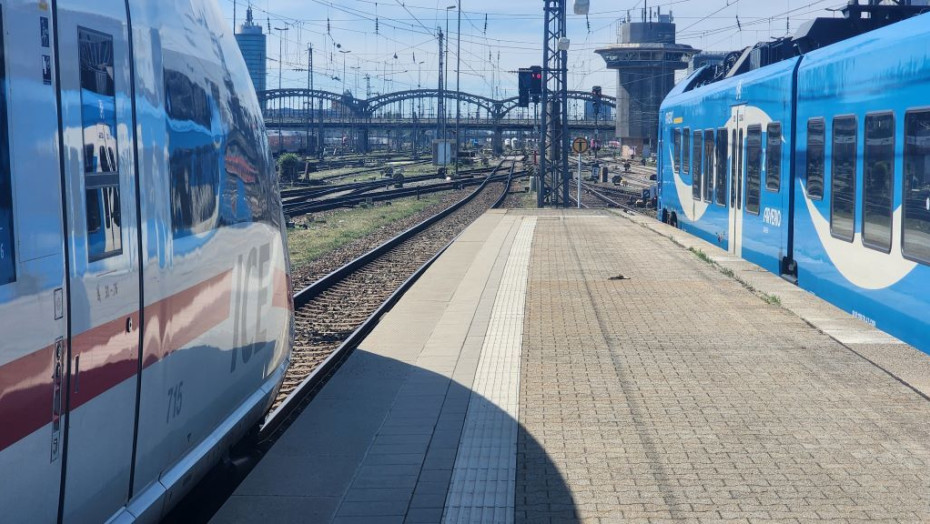
Travelling on German Trains
Discover insights to what you can expect on board and how tickets can be used
Share
Welcome to our guide to German trains and the international trains to/from Germany.
It explains the differences between the types of train services, shows what trains operate on each route and gives an insight into how frequently the trains operate on the major routes.
Use the Content menu to jump to the info you want or need to know.
OR grab a coffee and discover all the most pertinent info that will help your German train travel experience to be as fabulous as possible!
Good to know
In recent years three fundamental things have been occurring on the German rail network:
- A program of enhancement work on key routes led to temporary changes to the service patterns on many of the routes taken by the ICE express trains - but on the current timetable the usual service has been largely restored.
- Hundreds of new ICE 4 trains have entered service, so they are now the most common type of ICE train - all services between Germany and Switzerland are now covered by these trains; and they are also used on more than 80% of the ICE services to and from Hamburg.
- The introduction of these trains has also enabled some long-standing routes taken by IC trains to be either wholly converted, or mainly converted, to ICE routes - hence some ICE trains now take routes which don't involve travel on a purpose built high-speed line,
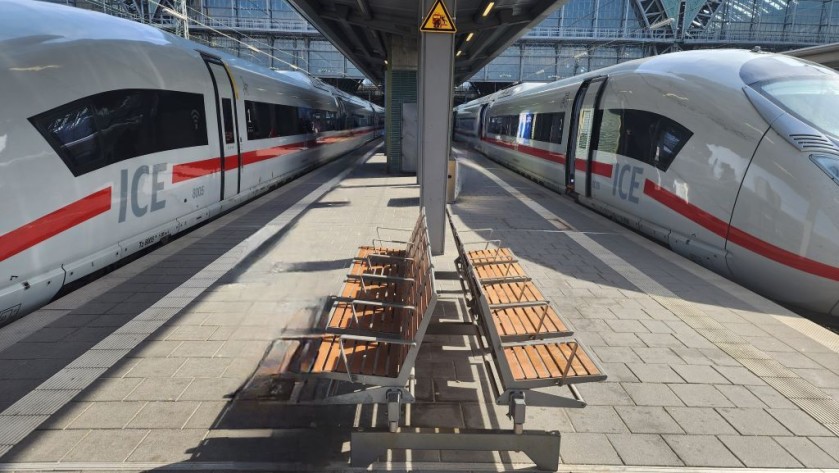
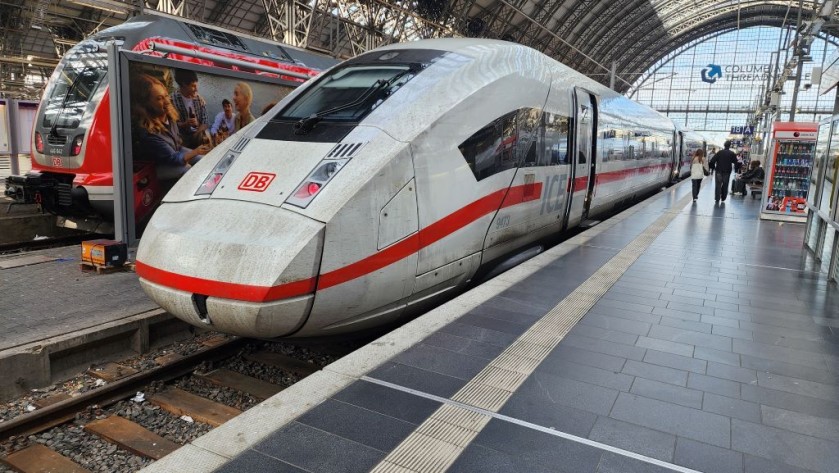
On journeys within Germany:
The types of train service:
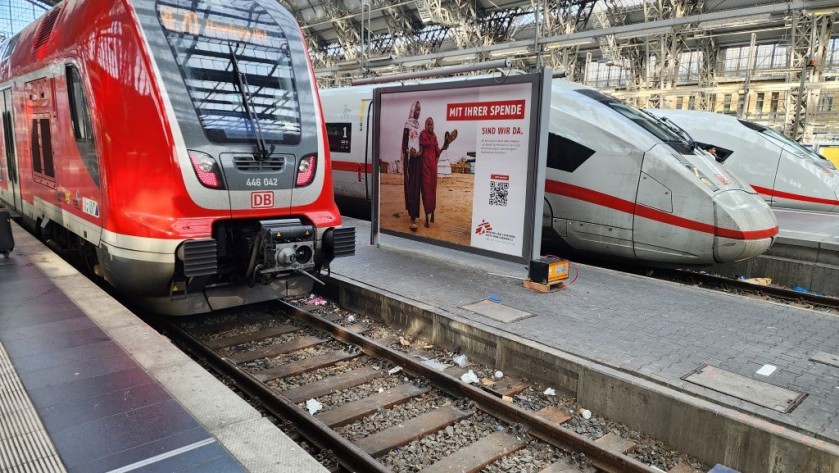
Deutsche Bahn (DB) is the national rail company in Germany and the train SERVICES it operates include:
(1) ICE trains – all of which travel on a high speed line for at least part of a journey.
There are now Seven different types of ICE train which operate on different routes within Germany.
(2) IC trains – long distance express trains that tend to be slower than ICE trains because they rarely use the high speed lines.
New double deck 'Intercity2' trains have been introduced on some routes.
(3) S-Bahn are local commuter trains that operate within the major cities and also link some cities, but they stop at every station that they pass through.
In Berlin, Frankfurt (Main), Hamburg and Munchen/Munich some of the S-Bahn trains travel across those cities and link the main stations, the hauptbahnhofs, to the city centres.
(4) Regio trains – that are a mix of
- long distance Regional Express (RE) trains, which can be an alternative to IC, ICE trains between closely spaced cities; when travelling between cities they are usually slower than IC or ICE trains, but faster than S-Bahn trains.
- Trains that link smaller towns, some of these services can travel fairly long distances.
- Local trains in rural areas.
Catering & Wi-fi on express trains:
All IC and ICE services have some form of on-board catering, but the specifics of what will be available depend on the specific type of train used on the departure that you will be travelling by.
Restaurant cars, which can be accessed by holders of First and Second class tickets, are available on all ICE trains.
Bar/bistro services are available on all ICE trains and on some longer-distance IC services, but on the new Intercity2 trains a more limited selection of items is available from the catering trolley, which will be taken through the train.
On the ICE services, First Class ticket holders can order food/drink from the bar or restaurant menus (when available) and have it delivered to their seats, but no complimentary catering is provided.
Wi-fi is now available on virtually all ICE trains (and a few IC trains including the new double deck IC trains), the portal is free and comparatively easy to access.
Seat reservations:
Reservations are now only automatically included when upgrading Flexpreis tickets to 1st class, or when booking Flexpreis Plus tickets for 1st and 2nd class travel.
When purchasing the cheaper Super Sparpreis and Sparpreis tickets for journeys by express train, you can opt to either:
- travel 2nd class and add a seat reservation for an additional fee of €4.90.
- book 1st class / upgrade a 2nd class ticket to 1st class and add a seat reservation for an additional fee of €5.90.
When booking Flexpreis tickets for travel in 2nd class, you can add a seat reservation for an additional fee of €4.90.
If your journey involves more than one EC, IC or ICE train, you will only have to pay one reservation fee, as it will cover all the trains you will be taking.
It is also possible to book reservations at a later date separately from the ticket booking, both online or by using DB branded ticket machines at stations.
Although if you do book your reservations later and your journey involves more than one train, you will then have to pay for separate reservations per train.
Select specific seats
When you opt to reserve, or automatically assigned reservations when booking 1st class Flexpreis tickets/ Flexpreis Plus tickets, DB tends to assign seats randomly.
So if you want your seats to be:
- by a window or on the aisle
- adjacent to a luggage rack
- in a compartment (when available)
- in a Quiet Zone
- at a table
you can select any seats which are still available on the seating plan.
Note that facilities such as compartments and Quiet Zones may be in an entirely different coach / carriage to that in which the seats you have been initially assigned are located.
Note that bar / restaurant cars are only shown on the seating plans if they also contain seats which can be reserved
All ICE trains have family compartments and / or family areas, but when making a booking for a party of adults + children, if you opt to add a reservation, you won't automatically be assigned seats in these family areas.
So you will need to find and select them (when still available) on the seating plan.
- On ICE 1 trains the larger family compartments are in coach 6 or in coaches 5 and 9, with additional smaller compartments in coach 5
- On ICE 2 trains they both in coach 25 and coach 35
- On ICE 3 trains both the family compartments and family areas are in coach 25 and coach 35
- On ICE 4 trains they are both in coach 9, or in coaches 24 / 34.
- On ICE T trains the family area is in coach 24, and on some ICE-T trains there is also a family compartment in coach 26, which is also the restaurant car.
Seat reservations are not available on Regio trains.
If you will be using a rail pass on trains within Germany, seat reservations are optional in both 1st AND 2nd class on IC and ICE trains; but the availability of seats isn't guaranteed if you haven't reserved
Quiet zones:
Also If you book 1st class tickets or 1st/2nd class reservations on ICE trains you can choose in which 'zone' on the train that you wish to travel by.
A less obvious aspect of travelling by ICE trains is that there are two types of seating zones/areas in both 1st and 2nd class - 'Quiet' and 'Phone'
Travellers are not supposed to use their phones in 'Quiet' coaches/zones, the conductor or your fellow passengers will ask you not to do so.
While if you know that it's likely that you will be making multiple calls during your journey, DB is suggesting that you book tickets in the 'Phone' coach/zone.
If you have no preference re; the amount of noise your fellow passengers are likely to generate when using their phones, you can select 'any' when booking a seat reservation, or 1st class ticket.
However, if you haven't reserved you'll be less likely to be aware of these 'zones' when boarding a train and looking for seats, you may unwittingly find a seat available in a 'mobile' or 'quiet' coach, which wouldn't have been your preference.
The main IC routes:
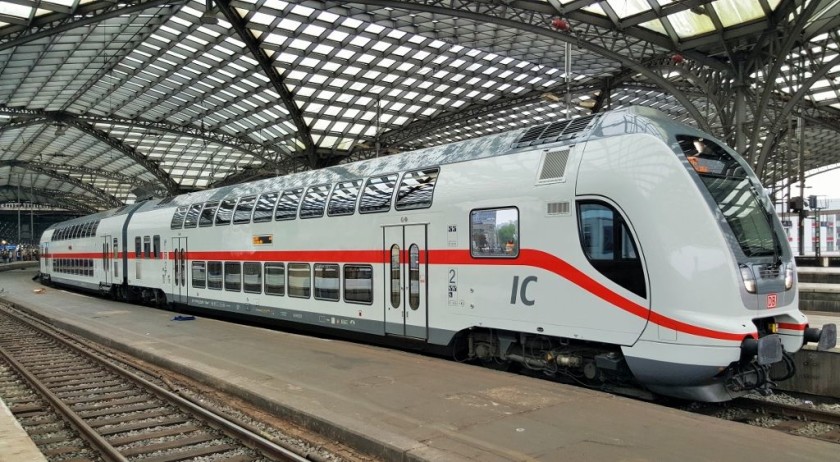
IC trains and not ICE trains provide all or the majority of the express train services on these routes:
- Karlsruhe - Stuttgart - Cralsheim - Nurnberg - Bamberg - Jena Paradies - Leipzig
- Leipzig - Halle - Magdeburg - Braunschweig - Hannover - Bremen - Oldenburg - Leer - Emden
- Dresden - Leipzig - Halle - Magdeburg - Braunschweig - Hannover - Bielefeld - Dortmund - Wuppertal - Koln - Bonn - Koblenz - Mainz - Frankfurt (Main) or Mannheim - Heidelberg - Stuttgart (ICE trains share this route)
- Gera - Weimar - Erfurt - Kassel - Paderborn - Hamm - Dortmund - Essen - Duisburg - Dusseldorf - Koln
- Koln - Dusseldorf - Duisburg - Gelsenkirchen - Munster (West) - Rheine - Leer - Emden
- Frankfurt (Main) - Siegen - Dortmund - Munster (West)
- Hamburg – Rostock – Stralsund
- Dresden - Berlin - Rostock - Warnemunde
- Cologne/Koln - Dusseldorf - Esssen - Dortmund - Bremen - Hamburg - Westerland (Sylt)
- Stuttgart - Horb - Singen - Zurich
Trains not operated by DB:
DB (Deutsche Bahn) is the German national rail operator, but it doesn't manage all of the train services in the country.
Regional services in particular can be operated by other companies, but train tickets are interchangeable.
Meaning that if you book a ticket at a station valid for a Regio train then it will be valid on any 'Regio train', no matter which company is providing the service.
Travelling on the Regio services:
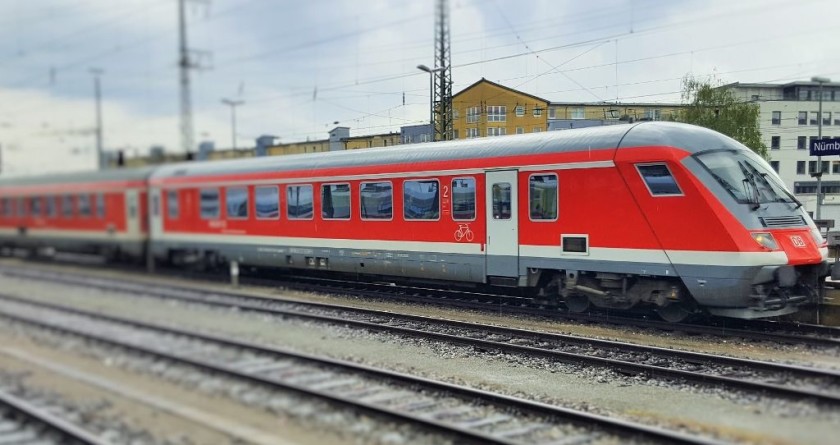
Regio train SERVICES can be broadly divided into four categories:
(1) Those that follow the routes of IC and ICE express trains, but stop at stations (including some airport/flughafen stations) that IC/ICE trains skip - so they are slower than the express trains.
(2) Trains that link multiple towns in built up areas, on routes that usually aren’t taken by IC or ICE trains.
(3) Semi-fast cross country trains in more rural areas.
These three faster services are categorised as RE 'Regional Express' trains and it can be worth looking out for these services, as they are quicker, but cost the same price as the slower Regio services - when both are an option.
The Regio trains that use double deck coaches are most often found on those three types of service.
(4) ‘Local’ trains OUTSIDE of the major cities which call at every station - so rural branch line trains fall into this category.
These slower trains are designated as RB services on timetables etc RB = 'RegionalBahn'.
Compare RE and RB services on timetables
So something to watch out for is that on certain routes some Regio trains, the RE trains can be faster than others because they skip stations, while the slower RB trains will be calling at every station.
As a result it can be worth checking the arrival times of Regio trains on the paper departure sheets.
An RE train that leaves later than an RB train, can actually reach its final destination sooner,
Travelling on the S-Bahn services:
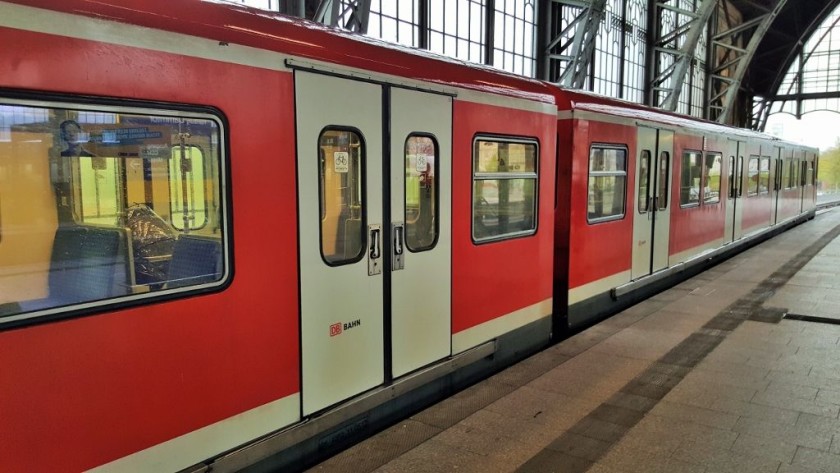
Two things in particular are worth knowing about S-Bahn trains:
(1) In Berlin, Frankfurt (Main), Hamburg and Munchen/Munich they penetrate further into the city centre than other train services.
So the fastest city centre access option in these cities can be connect into an S-Bahn train and not the metro (U-Bahn).
(2) S-Bahn trains always call at every station on their routes and some of these routes between cities can be particularly long.
So when travelling between cities, targeting the Regio trains instead will usually be a faster option; even if the next Regio train won't be departing for another 15 - 20mins
The on board information:
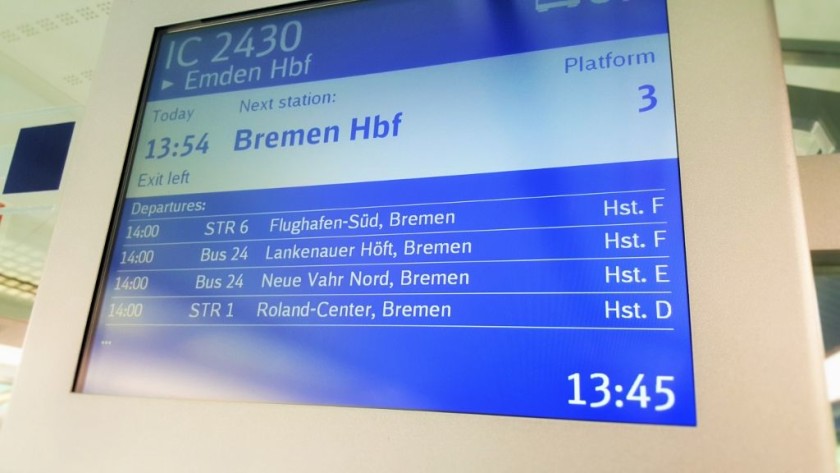
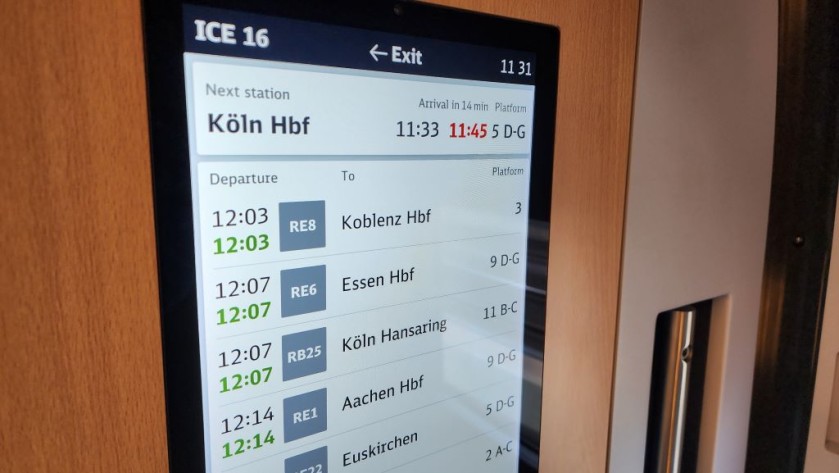
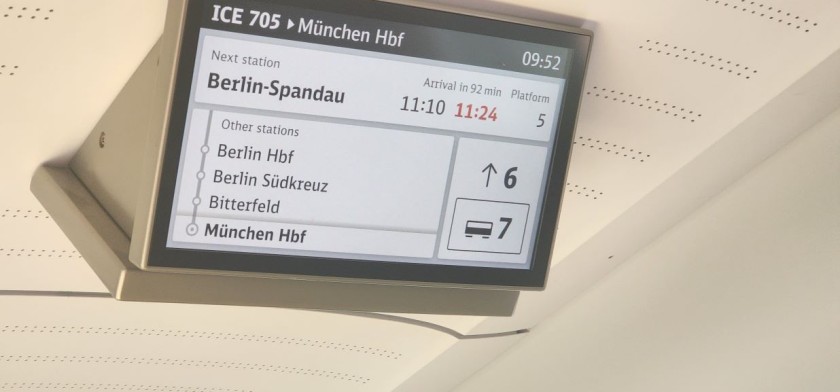
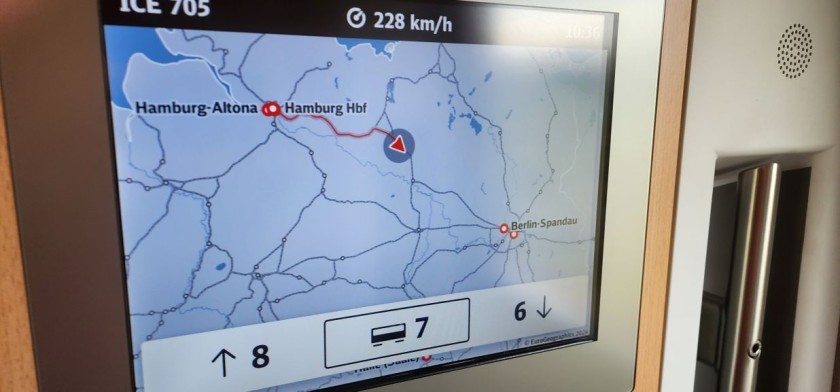
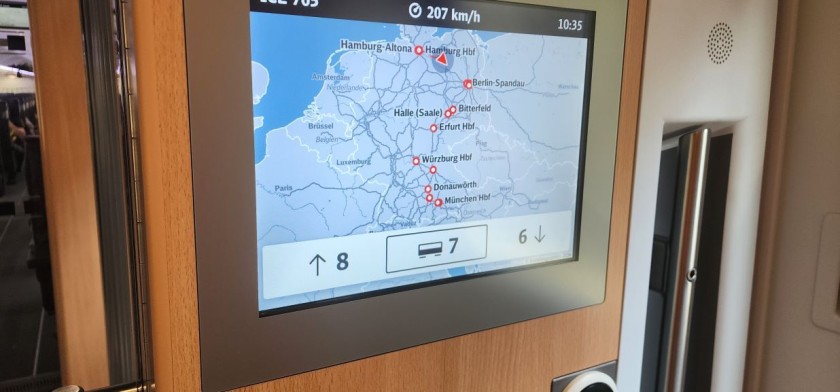
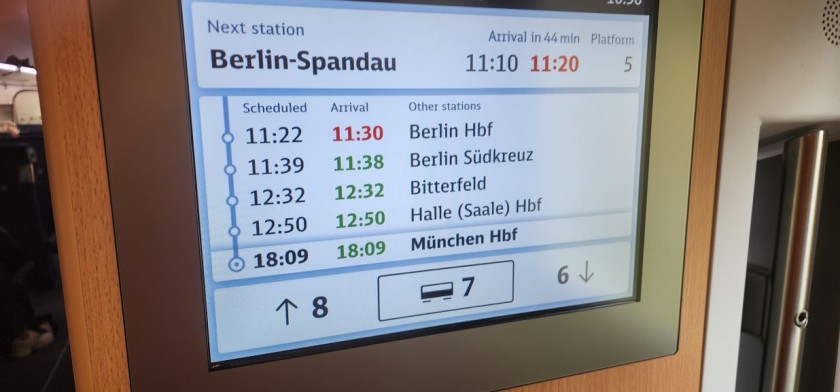
On train announcements can be in German only; they're usually made in English and German on the ICE trains, but when a train is delayed any pertinent info is usually then only delivered in German.
ICE trains and the new IC trains also have electronic info screens in each coach which will feature info about the journey.
They can be found on ceilings and end walls in the seating saloons and in the vestibules by the doors.
They have in effect replaced the paper info booklets which used to be left on the seats for each journey, as the screens switch between:
- showing the station calls, with both the scheduled time and the actual expected arrival time
- Summaries of the connections available at the next station call - with departure times and track numbers
- The current location of the train
So look out for the changes of info.
Good to know about the timetables:
German trains USUALLY depart to fixed regular timetables, particularly during the day, as a result on the routes taken by ICE trains and IC trains there is USUALLY a train departure every hour OR every other hour.
On routes taken by Regio trains, there is usually 1 x train per hour.
S-Bahn trains depart every 20 mins, every 30 mins or hourly - the longer distance routes tend to have 1 x train per hour.
ICE FREQUENCY SUMMARY:
Note that many services extend beyond the cities at either end of these routes - but those extensions are less frequently served.
1 x train per hour
(1) Berlin - Hannover - Hamm - Dortmund - Essen - Duisburg - Dusseldorf / Berlin - Hannover - Hamm - Wuppertal - Koln/Cologne hbf
(2) Hamburg - Hannover - Kassel - Wurzburg - Nurnberg - Munchen
(3) Essen - Duisburg - Dusseldorf - Koln/Cologne (Messe Deutz) - Frankfurt Airport - Frankfurt (Main) - Wurzburg - Nurnberg - Munchen
(4) Koln/Cologne hbf - Frankfurt Airport - Frankfurt (Main)
(5) Hamburg - Berlin - Erfurt - Nurnberg - Munchen
1 x train every other hour
(1) Hamburg - Hannover - Kassel - Frankfurt (Main) - Frankfurt Airport - Mannheim - Stuttgart
(2) Hamburg - Hannover - Kassel - Frankfurt (Main) - Mannheim - Kalrsruhe - Basel - Zurich
(3) Hamburg - Berlin - Leipzig Erfurt - Nurnberg - (Augsburg) - Munchen
(4) Berlin - Leipzig - Erfurt - Frankfurt (Main) - Mannheim - Stuttgart - Munchen
(5) Berlin - Kassel - Frankfurt (Main) - Mannheim - Kalrsruhe - Basel (- Bern - Interlaken)
(6) Dortmund - Koln Messe/Deutz - Frankfurt Airport - Mannheim - Stuttgart - Munchen
(7) Hamburg - Bremen - Dortmund - Koln/Cologne hbf - Frankfurt Airport - Mannheim - Stuttgart - Munchen
(8) Hamburg - Bremen - Dortmund - Koln/Cologne hbf - Frankfurt Airport - Mannheim - Kalrsruhe - Basel
(9) Berlin - Erfurt - Frankfurt (Main)
(10) Dresden - Leipzig - Erfurt - Frankfurt (Main) - Frankfurt Airport - Weisbaden
Note that alternate trains operate between some cities to provide an hourly frequency.
This includes
- Hamburg <> Frankfurt (Main)
- Berlin <> Frankfurt (Main)
- Koln - Frankfurt Airport - Mannheim
- Koln - Dortmund - Bremen - Hamburg
- Stuttgart <> Munchen
up to 6 x trains per day
(1) Berlin - Kassel - Frankfurt (Main) Sud - Frankfurt Airport
(2) Frankfurt (Main) - Wurzburg - Nurnberg - Regensburg - Linz - Wien/Vienna
Are German trains particularly punctual (if that's not a stupid question)?
Not a stupid question at all because the answer is 'No'.
We're being a bit cheeky here because long distance ICE trains and IC trains aren't particularly less punctual than the express train services in other large European countries, such as Great Britain, France and Italy.
But the British media seem to be a tad obsessed with the notion that British trains are particularly awful and inefficient compared to German trains and that simply isn't true.
German express train punctuality is very similar to the levels of punctuality achieved by British express trains.
Which type of ICE train per route: A general guide
The on board ambience varies between the different types of ICE train and there can be noticeable differences, such as whether compartment seats will be available.
But on many of the routes taken by ICE trains either only one type of train is used, or one specific type of ICE train dominates the service. Hence the guides below will provide an indication of the type of train you will likely be travelling by.
Though its not entirely comprehensive, the routes with an exceptionally sparse service haven't been included - And for the sake of clarity, the additional destinations which some trains serve at the start and finish of the routes have also been omitted.
Note that on some routes multiple types of ICE trains are used.
Also not all station calls have been included in these summaries.
This info was sourced on the fantastic train service info resource, Vagonweb.
to / from Hamburg
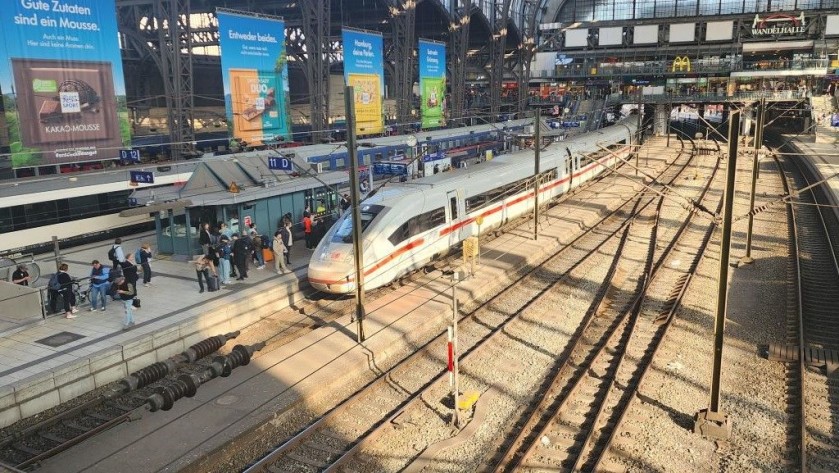
by ICE 1 train
- Hamburg - Hannover - - Frankfurt (Main) - Frankfurt Flughafen (Sprinter service)
by ICE 4 train
- Hamburg - Hannover - Kassel - Frankfurt (Main) - Frankfurt Flughafen - Mannheim -Stuttgart
- Hamburg - Hannover - Kassel - Frankfurt (Main) - Mannheim - Karlsruhe - Freiburg - Basel - Zurich - Chur
- Hamburg - Hannover - Kassel - Wurzburg - Nurnberg - Munich (the trains which don't join services from Bremen)
- Hamburg) - Hannover - Marburg - Frankfurt (Main) Heidelberg - Karlsruhe / Stuttgart
- Hamburg - Bremen - Dortmund - Koln Hbf - Frankfurt Flughafen - Mannheim -Stuttgart - Ulm - Augsburg - Munich
- Hamburg - Bremen - Dortmund - Koln Hbf - Frankfurt Flughafen - Mannheim - Karlsruhe - Freiburg - Basel
- Hamburg - Berlin - (Leipzig) - Erfurt - Bamberg - (Erlangen) - Nurnberg - Munich/Munchen
- Hamburg - Berlin - Erfurt - Nurnberg - Munich/Munchen (the Sprinter services)
by ICE 2 train
- Hamburg - Hannover - Kassel - Wurzburg - Nurnberg - Munich (the trains which DO join services from Bremen)
by ICE T train
- Hamburg - Hannover - Kassel - Wurzburg - Nurnberg - Linz - Wien
- Hamburg - Berlin - Erfurt - Nurnberg - Linz - Wien
to / from Berlin
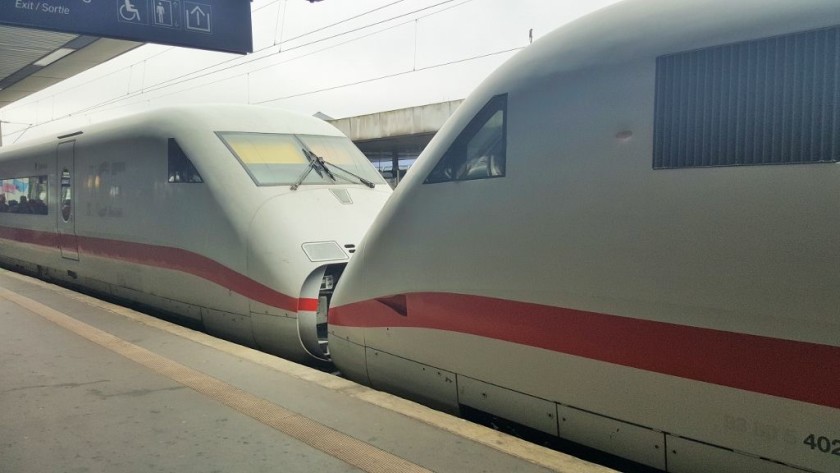
by ICE 1 train:
- Berlin Ost - Berlin Hbf - Berlin Spandau - Wolsfburg - Braunschweig - Kassel - Frankfurt (Main) Sud - Frankfurt Flughagen/Airport
- Berlin Ost - Berlin Hbf - Berlin Spandau - Frankfurt (Main) Hbf (Sprinter services)
- Berlin Gesundbrunnen - Berlin Hbf - Berlin Sudkreuz - Frankfurt (Main) Hbf (Sprinter services)
by ICE 2 train:
- Berlin Ost - Berlin Hbf - Berlin Spandau - Hannover - Bielefeld - Hamm - Wuppertal - Koln Hbf
- Berlin Ost - Berlin Hbf - Berlin Spandau - Hannover - Bielefeld - Hamm - Dortmund - Essen - Dusseldorf
the trains which divide in Hamm
by ICE 3 original train:
Berlin - Erfurt - Nurnberg - Munich/Munchen (the Sprinter services)
by ICE 4 train:
- Berlin - Leipzig - Erfurt - Frankfurt (Main) - Mannheim -Stuttgart - Ulm - Augsburg - Munich
- Berlin - (Leipzig) - Erfurt - Bamberg - (Erlangen) - Nurnberg - Munich/Munchen
- Berlin - Kassel - Frankfurt (Main) - Mannheim - Karlsruhe - Freiburg - Basel - Olten - Bern - Interlaken
- Berlin - Hannover - Bielefeld - Hamm - Wuppertal - Koln - Bonn (the trains which don't divide in Hamm)
- Berlin Ost - Berlin Hbf - Berlin Spandau - Koln Hbf (Sprinter services)
by ICE T train:
Berlin - Erfurt - Nurnberg - Linz - Wien
to / from Koln
by ICE 1 train:
- Koln hbf - Bonn - Koblenz - Mainz - Mannheim - Karlsruhe / Stuttgart
- Koln (Messe-Deutz) - Bonn - Koblenz - Mainz - Frankfurt (Main) - Wurzburg - Nurnberg
by ICE 2 train
Koln Hbf - Wuppertal - Hamm - Bielefeld - Hannover - Berlin Spandau - Berlin Hbf - Berlin Ost (the trains which join in Hamm).
by ICE 3 train - multiple types:
Koln Hbf - Frankfurt Airport - Frankfurt (Main)
by ICE 3neo train:
- Koln Hbf - Dusseldorf - Arnhem - Utrecht - Amsterdam
- Koln Hbf - Aachen - Liege - Bruxelles
- Koln (Messe-Deutz) - Frankfurt Airport - Mannheim - Stuttgart - Ulm - Augsburg - Munchen
by ICE 3 original train and ICE 3 Velaro train:
Koln (Messe-Deutz) - Frankfurt Airport - Frankfurt (Main) - Wurzburg - Nurnberg - Munchen
by ICE 4 train:
- Koln Hbf - Frankfurt Airport - Mannheim - Stuttgart - Ulm - Augsburg - Munchen
- Koln Hbf - Frankfurt Airport - Mannheim - Karlsruhe - Freiburg - Basel
- Koln Hbf - Dortmund - Osnabruck - Bremen - Hamburg
- Koln Hbf - Wuppertal - Hamm - Bielefeld - Hannover - Berlin Spandau - Berlin Hbf - Berlin Ost (the trains which don't join in Hamm)
- Koln Hbf - Berlin Spandau - Berlin Hbf - Berlin Ost (the Sprinter service)
by ICE T train:
- Koln Hbf - Bonn - Koblenz - Mainz - Frankfurt (Main) - Wurzburg - Nurnberg - Linz - Wien
to / from Frankfurt
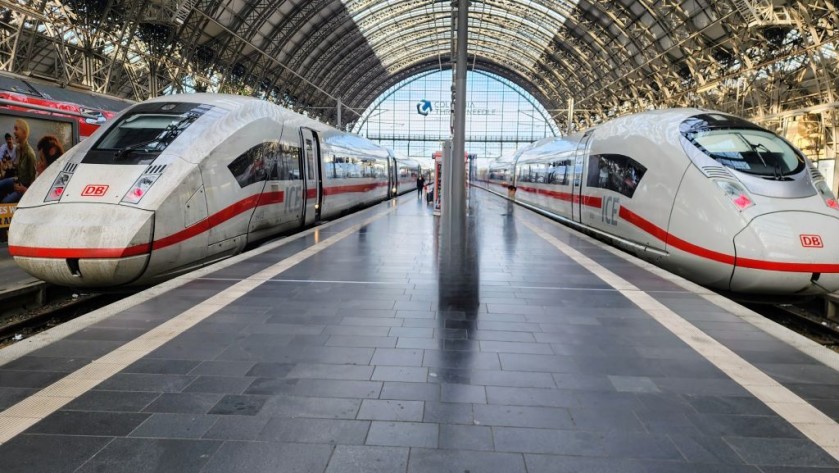
by ICE T train:
- Frankfurt (Main) Hbf - Wurzburg - Nurnberg - Linz - Wien
- Frankfurt (Main) Hbf - Frankfurt Airport - Mainz - Koblenz - Bonn - Koln Hbf - Dusseldorf - Dortmund
by ICE 1 train:
- Frankfurt (Main) Hbf - Frankfurt Airport - Mainz - Koblenz - Bonn - Koln Hbf - Dusseldorf - Dortmund - Bremen - Hamburg
- Frankfurt (Main) Hbf - Wurzburg - Nurnberg
- Frankfurt (Main) Hbf - Heidelburg - Stuttgart
- Frankfurt (Main) Sud - Kassel - Braunschweig - Wolsfburg - Berlin Spandau - Berlin Hbf - Berlin Ost
- Frankfurt (Main) Hbf - Berlin Spandau - Berlin Hbf - Berlin Ost (Sprinter services)
- Frankfurt (Main) Hbf - Berlin Sudkreuz - Berlin Hbf - Berlin Gesundbrunnen (Sprinter services)
- Frankfurt (Main) Hbf - Hannover - Hamburg (Sprinter service)
- Frankfurt (Main) Hbf - Erfurt - Halle - Berlin Sudkreuz - Berlin Hbf - Berlin Gesundbrunnen
- Frankfurt (Main) Hbf - Erfurt - Halle - Berlin Sudkreuz - Berlin Hbf - Berlin Gesundbrunnen
- Frankfurt (Main) Hbf - Frankfurt Airport - Koln Messe/Deuutz - Dusseldorf - Essen
- Frankfurt (Main) Hbf - Wurzburg - Nurnberg - Munchen
-
Frankfurt (Main) Hbf - Wurzburg - Nurnberg - Munchen
-
Frankfurt (Main) Hbf - Strasbourg or Kaiserslautern - Paris
-
by ICE 3neo train:
-
Frankfurt (Main) Hbf - Frankfurt Airport - Koln Hbf or Koln Messe/Deuutz - Dusseldorf - Armhem - Utrecht - Amsterdam
-
Frankfurt (Main) Hbf - Frankfurt Airport - Koln Hbf - Aachen - Liege - Bruxelles
-
Frankfurt (Main) Hbf - Frankfurt Airport - Limburg Sud - Montabaur - Koln Hbf
by ICE 4 train:
-
Frankfurt (Main) Hbf - Erfurt - Leipzig - Halle - Berlin Sudkreuz - Berlin Hbf
-
Frankfurt (Main) Hbf - Kassel - Braunschweig - Wolsfburg - Berlin Spandau - Berlin Hbf - Berlin Ost
-
Frankfurt (Main) Hbf - Kassel - Hannover - Hamburg
-
Frankfurt (Main) Hbf - Marburg - Hannover - Hamburg
-
Frankfurt (Main) Hbf - Heidelberg - Karlsruhe / Stuttgart
-
Frankfurt (Main) Hbf - Frankfurt Flughafen - Mannheim -Stuttgart
-
Frankfurt (Main) Hbf - Mannheim -Stuttgart - Ulm - Augsburg - Munich
-
Frankfurt (Main) Hbf - Mannheim - Karlsruhe - Freiburg - Basel - Olten - Bern - Interlaken
-
Frankfurt (Main) Hbf - Mannheim - Karlsruhe - Freiburg - Basel - Zurich - Chur
to / from Munchen
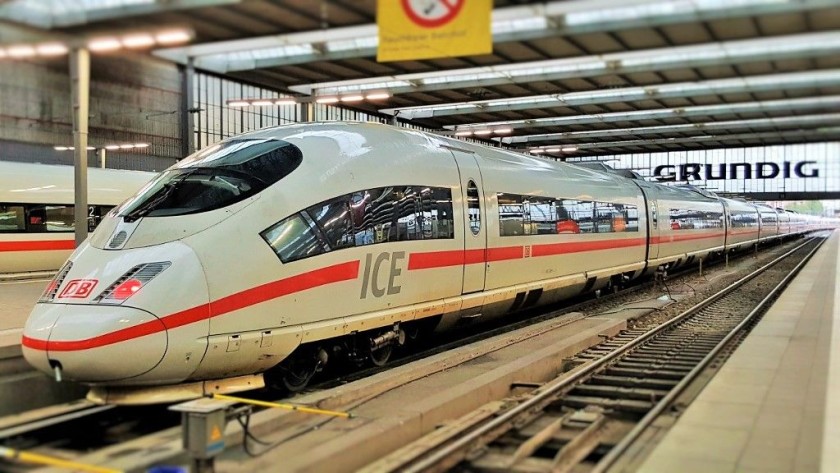
- Munchen - Nurnberg - Erfurt - Berlin (Sprinter services)
- Munchen - Nurnberg - Bamberg - Erfurt - Halle - Berlin - Hamburg
- Munchen – Nurnberg – Wurzburg - Frankfurt Main – Frankfurt Flughafen – Koln Messe/Deutz – Dusseldorf – Essen
- Munchen - Augsburg – Ulm - Stuttgart - Karlsruhe (- Freiburg - Basel)
by ICE 3 Velaro train:
Munchen – Nurnberg – Wurzburg - Frankfurt Main – Frankfurt Flughafen – Koln Messe/Deutz – Dusseldorf – Essen
by ICE 3neo train:
- Munchen - Augsburg – Ulm - Stuttgart - Mannheim – Frankfurt Flughafen – Koln Messe/Deutz – Dusseldorf – Essen – Dortmund
- Munchen - Augsburg – Ulm - Stuttgart - Mannheim – Frankfurt Flughafen – Koln Hbf - Dusseldorf - Arnhem - Utrecht - Amsterdam
by ICE 4 train:
- Munchen - Augsburg – Ulm - Stuttgart - Mannheim – Frankfurt Flughafen – Koln Hbf – Wuppertal – Dortmund - Bremen - Hamburg
- Munchen - Augsburg – Ulm - Stuttgart - Mannheim – Frankfurt (Main) - Erfurt - Leipzig - Halle - Berlin
- Munchen - Nurnberg - Bamberg - Erfurt - Leipzig - Halle - Berlin - Hamburg
- Munchen - Nurnberg - Bamberg - Erfurt - Halle - Berlin - Hamburg
- Munchen - Nurnberg - Wurzburg - Kassel - Hannover - Hamburg
by ICE 2 train
- Munchen - Nurnberg - Wurzburg - Kassel - Hannover - Hamburg and Bremen
to / from Stuttgart
- by ICE 1 train
- Stutthart - Heidelberg - Frankfurt (Main) Hbf - Frankfurt Airport - Mainz - Koblenz - Bonn - Koln Hbf - Dusseldorf - Dortmund - Bremen - Hamburg
by ICE 3neo train:
- Stuttgart - Mannheim – Frankfurt Flughafen – Koln Messe/Deutz – Dusseldorf – Essen – Dortmund
- Stuttgart - Mannheim – Frankfurt Flughafen – Koln Hbf - Dusseldorf - Arnhem - Utrecht - Amsterdam
- Stuttgart - Ulm - Augsburg - Munchen
by ICE 3 Velaro train:
Stuttgart - Strasbourg - Paris
by ICE 4 train
- Stuttgart - Ulm - Augsburg - Munchen - (Salzburg)
- Stuttgart - Mannheim – Frankfurt Flughafen – Koln Hbf – Wuppertal – Dortmund - Bremen - Hamburg
- Stuttgart - Mannheim – Frankfurt Flughafen – Frankfurt (Main) - Kassel - Hannover - Hamburg
- Stuttgart - Mannheim – Frankfurt (Main) - Erfurt - Leipzig - Berlin
to / from Basel
by ICE 4 train
- Freiburg - Karlsruhe - Mannheim – Frankfurt Flughafen – Koln Hbf – Dusseldorf - Essen – Dortmund - Bremen - Hamburg
- Freiburg - Karlsruhe– Mannheim – Frankfurt (Main) - Kassel - Hannover - Hamburg
- Freiburg - Karlsruhe– Mannheim – Frankfurt (Main) - Kassel - Braunschweig - Wolfsburg - Berlin
Travelling with Bicycles
How you travel with a non-folding bike in Germany depends on the type of train service you will be traveling by.
on the ICE trains
On the IC and EC trains
Taking a non-folding bike on board an IC train, or an EC train for a journey within Germany:
All of the express trains used for these services have bike racks, so to take a bike on board you need to both purchase a ticket AND a bike reservation, in order to secure a space for your bike.
The flat rate fee, irrespective of distance, for a combined bike ticket and reservation is €9.
On local and regional trains
Non-folding bikes can generally be taken on board Regio and S-Bahn trains, but specific terms and conditions such as, bikes being restricted at certain times of day (rush hours) and whether bike tickets are required, are dependent on the region in which you will be travelling.
The specific terms can also include only needing to purchase a bike ticket during rush hours, or bike tickets being valid for a day’s travel and not just on specific departures.
So it’s worth clicking on the links to the specific regional information on this page on the DB website– using Google Translate if need be.
Though what’s universal when taking bike on to any Regio train service is that bike spaces can’t be reserved in advance, so you cannot ever be 100% certain that space will be available on the train that you have boarded.
If it’s not, then it’s likely that the conductor will ask you to leave the train.
Making use of the DB website
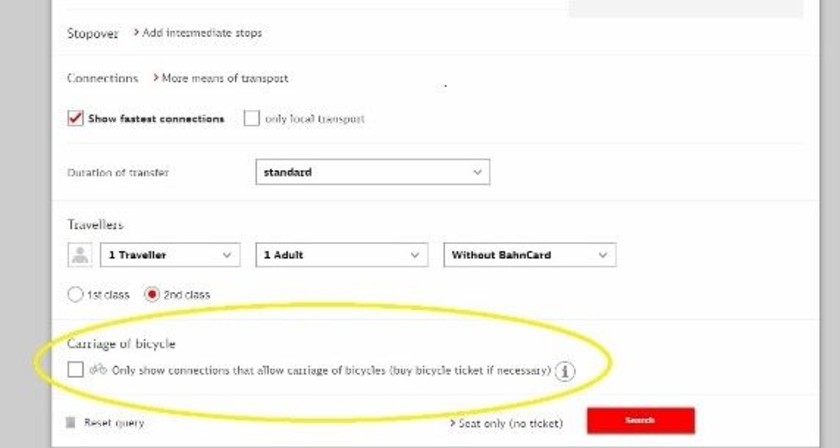

Though what can hugely help with making sense of all the above - and for planning journeys which avoid the ICE trains that don't permit non-folding bikes on board, is to make use of the additional journey search options on the DB website.
You need to click on the circled button on the home page BEFORE you look up a journey.
Then having doing so, towards the bottom of the screen, you will then see - as per the second image
Look for a journey guide
Other guides to German rail travel
International trains from and to Germany:
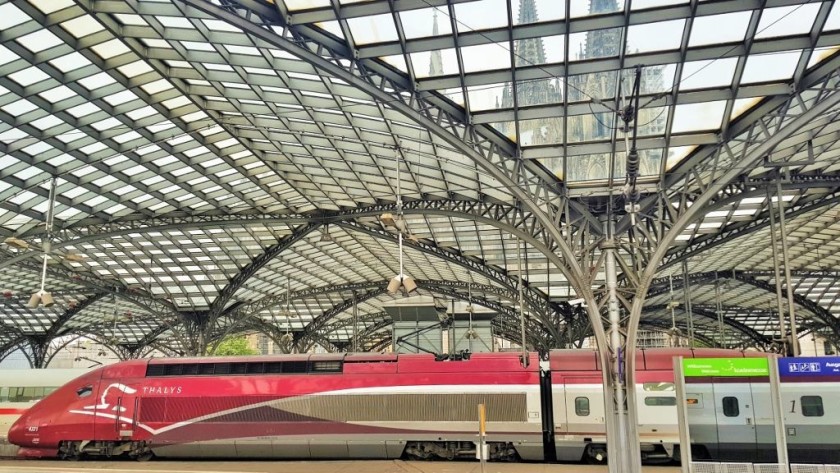
These are the FOUR key things worth knowing about international EXPRESS trains from/to Germany:
(1) International trains when operated by DB (Deutsche Bahn) are referred to online, at stations and on timetables as IC or ICE trains.
A a general rule is that EC (EuroCity) is used in Germany when another country is operating the train.
So that if you board an EC train in Germany heading to Switzerland, you will be usually travelling on a Swiss train.
OR board an EC train heading to The Czech Republic and you will usually find yourself on a Czech train etc.
(2) Eurostar formerly Thalys is the only direct train service between northern Germany and Paris.
(3) On international ICE trains the DB Wi-Fi portal is only available in Germany; an on board announcements are multi-lingual.
(4) Overnight trains still link Germany to Austria, Hungary Italy, Croatia, Slovenia, Switzerland and The Czech Republic and now The Netherlands.
The services on each international route summarised:
The primary international DAYTIME train services are listed below, not all trains call at stations in brackets.
Services marked with an* require compulsory reservation - seats will automatically be assigned when booking tickets, but rail pass users will need to reserve prior to boarding.
Routes that have a minimum of 3 x departures per day:
By Eurostar formerly Thalys train
((Dortmund – Essen – Dusseldorf) – Koln – Aachen – Liege – Bruxelles Midi/Zuid – Paris Nord
By TGV trains
- (Munich/Munchen – Augsburg – Ulm) – Stuttgart – Karlsruhe – Strasbourg – Paris Est
- Frankfurt (Main) – Mannheim (– Karlsruhe – Strasbourg) – Paris Est
- Frankfurt (Main) – Mannheim - Kaiserslautern - Paris Est
By ICE trains:
- ICE 3 Velaro: Frankfurt (Main) – Mannheim - Kaiserslautern - Paris
- ICE 3 Velaro: Frankfurt (Main) – Mannheim - Karlsruhe - Strasbourg - Paris
- ICE 3 Velaro: Stuttgart – Karlsruhe – Strasbourg – Paris Est
- ICE 3neo: Frankfurt Main – Koln - Aachen – Liege – Bruxelles Nord - Bruxelles Midi/Zuid
- ICE 3neo: Frankfurt (Main) – Koln – Dusseldorf – Duisburg – Arnhem – Utrecht - Amsterdam
- ICE 4 Hamburg – Hannover – Kassel - Frankfurt (Main) – Baden Baden – Freiburg – Basel – Zurich – (Chur)
- ICE 4 Berlin – Kassel – Frankfurt Main – Mannheim – Freiburg – Basel – (Bern – Interlaken)
- **ICE T**: (Koln/Cologne – Bonn – Koblenz – Mainz) – Frankfurt (Main) – Wurzburg – Nurnberg – Linz – Wien/Vienna
By EC (EuroCity trains) or International IC / ICE trains:
- EC: Hamburg – Lubeck – Nykobing – Copenhagen/Kobenhavn (reservations are compulsory in summer and highly recommended on all journeys)
- EC: Berlin – Frankfurt Oder – Poznan - Warszawa*
- IC: Berlin – Hannover – Osnabruck – Rheine – Deventer – Amersfoort – Amsterdam
- EC: (Hamburg) – Berlin – Dresden – Decin – Praha/Prague – (Brno – Bratislava – Budapest)
- EC: Hamburg – Bremen – Dortmund – Koln/Cologne – Bonn – Koblenz – Mainz – Mannheim - Freiburg – Basel – (Bern – Interlaken)
- IC: Stuttgart – Singen – Schaffhausen – Zurich
- ECE: Munich/Munchen – Lindau – St Gallen – Zurich
- Railjet and EC: Munich/Munchen – Innsbruck – Bolzano – Trento – Verona – (Vicenza – Padua/Padova – Venice/Venezia) OR Bologna)*
- EC and Railjet: Frankfurt (Main) – Darmstadt – Stuttgart – Ulm – Augsburg – Munchen/Munich – Salzburg – Bad Gastien - Villach - Klagenfurt
By Austrian Railjet trains
Railjet: Munich/Munchen – Salzburg – Linz – Wien/Vienna – Budapest
There are only 1 or 2 x departures per day on these routes:
By EC (EuroCity trains) or International IC trains
- EC: Munich/Munchen – Salzburg – Villach (connections to –Ljubljana – Zagreb)
- ICE 4 – Munster – Koln /Cologne – Bonn – Koblenz – Mainz – Mannheim – Stuttgart – Ulm – Lindau – Bregenz – St Anton – Innsbruck
- EC: Frankfurt (Main) – Mannheim – Karlsruhe – Freiburg - Basel - Zurich- Bellinzona - Lugano - Como - Milano
Reservations are required when travelling to/from Italy by this train.
Other routes with 1 x departure per day:
- ICE 3neo: Amsterdam – Utrecht – Duisburg – Dusseldorf) – Koln/Cologne – Mannheim – Stuttgart - Ulm - Augsburg - Munchen/Munich
- DB/SNCF: Frankfurt (Main) – Mannheim – Karlsruhe – Baden Baden - Strasbourg – Mulhouse – Lyon – Avignion - Marseille
- ICE 3 Velaro: Amsterdam – Utrecht – Duisburg – Dusseldorf) – Koln/Cologne – Mannheim – Stuttgart - Ulm - Augsburg - Munchen/Munich
- ICE 3 Velaro: Berlin - Frankfurt (Main) Sud - Karlsruhe - Strasbourg - Paris
Please support ShowMeTheJourney
This second version of ShowMeTheJourney is exciting and new, so we are genuinely thrilled that you are here and reading this, but we also need your help.
We’re striving not to let anything get in the way of providing the most useful service possible, hence a facility has been set up with DonorBox which can be used to support the running costs and make improvements.
Instead of advertising or paywalls, your financial support will make a positive difference to delivering an enhanced service, as there’s a lot of ideas which we want to make happen.
So if you have found the info provided here to be useful, please go here to say thank you.

Simon Harper
I wanted to share my passion for train travel and explain how anyone can take the fantastic journeys I have taken.

This is one of more than 100 train travel guides available on ShowMeTheJourney, which will make it easier to take the train journeys you want or need to make. As always, all images were captured on trips taken by ShowMeTheJourney.
This second version of ShowMeTheJourney is exciting and new, so we are genuinely thrilled that you are here and reading this, but we also need your help.
We’re striving not to let anything get in the way of providing the most useful service possible, hence a facility has been set up with DonorBox which can be used to support the running costs and make improvements.
Instead of advertising or paywalls, your financial support will make a positive difference to delivering an enhanced service, as there’s a lot of ideas which we want to make happen.
So if you have found the info provided here to be useful, please consider saying thank you.





